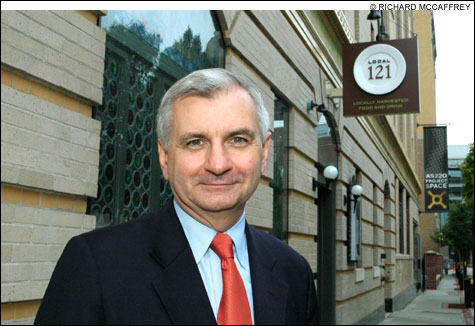
CENTER OF ATTENTION: While speculation continues about Reed’s possible place in an Obama
administration, he has consistently described a desire to remain in the Senate. |
After almost 20 years in Congress, moving through disparate settings has become familiar for US Senator Jack Reed.
So it wasn’t particularly surprising when Barack Obama asked Reed — who, thanks to his West Point- Army Ranger background, offers a respected voice on national security issues — to join him as part of a bipartisan delegation to Iraq, Afghanistan, Kuwait, and Jordan last month.
Similarly, the way in which Reed sat down with liberal bloggers from Rhode Island’s Future for an August 7 videotaped interview at Local 121, the downtown Providence restaurant and bar, shows how the Democrat makes regular appearances around the Ocean State.
As he closes out his second six-year term in the Senate, perhaps the most elite club in politics — and a long way from his modest roots in Cranston — Reed is the subject of ongoing speculation about his future.
The focus is whether he will take a role in a Democratic administration should Obama win the presidential election in November.
In response to such guessing, Reed’s mantra is that he wants to stay in the Senate. Considering how the 58-year-old senator has an almost-$4 million war chest and consistently polls as the most popular elected official in Rhode Island, he’s a virtual lock to beat his two opponents, Democrat Christopher F. Young and Republican Robert Tingle.
To some, Reed’s early disavowals of interest in an administration position seemed questionable, partly because of his call to service and partly because of the enhanced opportunities in the private sector that come with White House experience.
It’s true, too, barring a change by the Democrat-controlled General Assembly, that Republican Governor Donald L. Carcieri will retain the authority to name a replacement if Reed were to win election in November and then take another post, thereby narrowing the margin of Democratic control in the Senate.
If Obama wins and insists that Reed accept the secretary of defense job, “It would be hard for any American to say no to that,” acknowledges Sheldon Whitehouse, Rhode Island’s junior senator.
Yet there’s a case to be made not just that Reed truly wants to remain in the Senate, but that it’s the best place for him to be.
“Right now, he is money in the bank for Rhode Islanders,” says Whitehouse, offering a view not necessarily restricted to partisan Democrats. Earlier this year, Knowlegis ranked Reed as the 17th most-influential of the 100 senators. And with seats on the powerful Senate Appropriations Committee and on the Senate Armed Services Committee, his influence is bound to grow with the passage of time. This is far more consequential for Rhode Island than the short-term boost in the collective consciousness that would come with a Cabinet appointment.
Reed may not be charismatic or a generator of new ideas. But the qualities that underlie his high approval ratings — thoughtfulness, diligence, trustworthiness, and remembering his roots — represent the flip side of Rhode Island’s less savory politics.
Not coincidentally, the Ocean State has a tradition of electing senators who remain in office for long periods of time, going back to the likes of Nelson W. Aldrich — who was dubbed “the General manager of the Nation,” because of his command of monetary policy in the first decade of the 20th century — and more recently exemplified by such civic-minded figures as Theodore F. Green, John O. Pastore, Claiborne Pell, and John Chafee.
“Jack is right in that direction,” says Whitehouse, “and historians looking back will find him a more meaningful figure in the Senate than some of those.”
The media guessing game
If Reed has any pique about a seemingly unending barrage of media questions about his future, he’s not letting on.
Yet back in April 2007 when I wrote on the Phoenix’s Not for Nothing blog that Reed was being coy in response to my inquiry about his potential place in a new Democratic administration, Chip Unruh, the senator’s DC-based press secretary, got in touch to say that he considered Reed’s answer — that he felt privileged to serve in the Senate and hoped to win reelection — “pretty categorical.”
If the spokesman had hoped to successfully pre-empt continued questioning along the same line by reporters in Rhode Island and in Washington, it didn’t work.
In July 2007, for example, Andy Miga, a DC-based reporter for the Associated Press, wrote about how “the low-key, unassuming” Reed, who “tends to get overlooked in the Senate where more brash personalities and shrill partisan attacks dominate” was at center stage during a heated debate over the war in Iraq.
“The former Army captain has cemented his role as a leading Democratic voice on the war,” Miga wrote. “There’s even speculation he could be tapped as defense secretary or another high-level post if Democrats capture the White House in 2008.